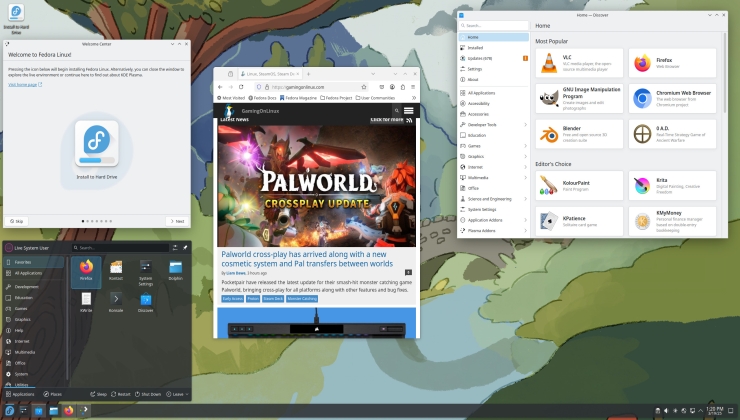The future of Linux distributions in many ways seems like immutable may be a good path, and now the Manjaro team want you to test out their own version of it with Manjaro Summit. Originally called Manjaro Immutable, it's now Manjaro Summit and a public Alpha release has now been made available.
More about it as explained by a developer:
Manjaro Summit is a semi-immutable distro with an atomic update system. Updates are done by downloading pre-made disk images, the root partition is read-only and only parts of the filesystem are migrated upon update.
The benefit of such a system is that everyone is running a near identical system configuration, this makes it easier to reproduce bugs and issues. Images can also be tested before being published. And should an update prove to be bad, you can simply roll back to an older unaffected version.
The immutability makes the system more resistant to user and software error, it also provides some limited protection against malware.
We are still unsure what Summit will eventually become, a stable rolling workstation distro, or an always moving distro chasing the latest and greatest in software.
The technology powering summit is purpose build to be as simple as possible, it is encouraged for people to start building and sharing images and configurations which fit their usecase or that of a wider community.
There's still quite a lot missing and to be done on it, since it's a public Alpha testing release.
More info and download links in the forum post.
Surely Manjaro wouldn't blame its users for the endless issues with this cursed nonsense distro, nor deflect its own responsibility in creating said issues. Just random software issues I guess. Very mysterious. Quite enigmatic. A peculiar conundrum.
Only issue I've had was a them not updating the keys correctly for one of the updates a few years back.
So No clue as to why Manjaro gets so much flak. All distros screw up occasionally.
Biggest problem with any distro is the user 99% of the time.
"Surely Manjaro wouldn't blame its users for the endless issues with this cursed nonsense distro..."
Say what? I've been using Manjaro for a few years and have had zero issues with it. It's fast, rock solid stable, and every single software update just works. And judging by the survey the developers run for every update, where the overwhelming majority of users vote "No issues; everything went smoothly", my experience is typical.
The vitriol it garners feels like the same hate Canonical garner for... existing? Trying something new? Not being perfect?
I welcome this news, because I'm not sure that Manjaro really has a USP (unique selling point) any more. It used to be "easy access to Arch, with added stability". But of course, the way they tried to provide stability (running two weeks behind Arch) often introduced instability (mainly inside AUR)! And many, many Arch-based options exist now, all with simple to use installers.
Here's hoping they get some mojo back.
I would be less categorical talking about love or hate, some people are wary of Manjaro for various mistakes the Manjaro team have made, the same apply to Canonical. Each mistake a distro team do, they lose a little trust.
That's a pity for Manjaro through, I like their theme way better than Endeavour's (please no more badly IA generated wallpaper).
I left Manjaro for two reasons. Manjaro's support for legacy Nvidia GPUs was really bad. They knew it and didn't care to do anything about it. More current drivers were available on other distros but not theirs. The final straw was when I heard they were planning on introducing M$ style telemetry, turned on by default.
I moved on. I have not since found a KDE Plasma distro I liked as much. Instead, I run on Xfce or Pop!_OS for my gaming.
Try openSUSE Tumbleweed. Ofc it's not perfect, repo choices are a bit lacking sometimes, but there's packman that helps a lot (+ flatpak and appimages are more common nowadays). It's great distro overall and one of the best parts is it has preconfigured snapper built-in, which is a life saver in case somethings breaks.
Now, that's one distro I haven't tried. I heard that openSUSE Tumbleweed was more for advanced power users (much like Arch) and, assuming it might have a steep learning curve, I skipped over it. I prefer distros that "just work" with minimal tweaking -- well, like Linux Mint, for example. I'll admit, the rolling release feature is appealing, though.









 How to set, change and reset your SteamOS / Steam Deck desktop sudo password
How to set, change and reset your SteamOS / Steam Deck desktop sudo password How to set up Decky Loader on Steam Deck / SteamOS for easy plugins
How to set up Decky Loader on Steam Deck / SteamOS for easy plugins
See more from me